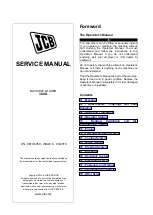
FOREWORD
HOISTING INSTRUCTIONS
00-8
WA500-6
9.
Apply wire ropes from the middle portion of the hook.
•
Slinging near the edge of the hook may cause the
rope to slip off the hook during hoisting, and a
serious accident can result. Hooks have maximum
strength at the middle portion.
10. Do not use twisted or kinked wire ropes.
11. When lifting a load, observe the following.
•
Wind in the crane slowly until wire ropes are
stretched. When settling the wire ropes by hand, do
not grasp them but press them from above. If you
grasp them, your fingers may be caught.
•
After the wire ropes are stretched, stop the crane
and check the condition of the slung load, wire
ropes, and pads.
•
If the load is unstable or the wire rope or chains are
twisted, lower the load and lift it again.
•
Do not lift the load at a slanted angle.
12. When lowering a load, observe the following.
•
When lowering a load, stop it temporarily at 30 cm
(12 in) above the floor, and then lower it slowly.
•
Check that the load is stable, and then remove the
sling.
•
Remove kinks and dirt from the wire ropes and
chains used for the sling work, and put them in the
specified place.
Precautions for Using Mobile Crane
00
★
Read the
Operation & Maintenance Manual
provided
with the crane in advance and operate the crane safely.
Precautions for Using Overhead Hoist
Crane
00
1.
Before starting work, inspect the wire ropes, brake,
clutch, controller, rails, overwind stop device, ground
fault prevention breaker, crane collision prevention
device, and power application warning lamp, and check
safety.
2.
Observe the signs for sling work.
3.
Operate the hoist at a safe place.
4.
Check the direction indicator plates (east, west, south,
and north) and the directions of the control buttons
without fail.
5.
Do not sling a load at a slant. Do not move the crane
while the slung load is swinging.
6.
Do not raise or lower a load while the crane is moving
longitudinally or laterally.
7.
Do not drag a sling.
8.
When lifting a load, stop it just after it leaves the ground
and check safety, and then lift it.
9.
Consider the travel route in advance and lift a load to a
safe height.
10. Place the control switch at a position where it is not an
obstacle to work and passage.
11. After operating the hoist, do not swing the control
switch.
12. Remember the position of the main switch so that you
can turn off the power immediately in an emergency.
WARNING!
Heavy parts (25 kg (55 lb) or
more) must be lifted with a
hoist, etc. In the
Disassembly
and Assembly
section, every
part weighing 25 kg or more is
indicated clearly with the
symbol.



































